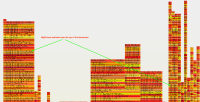-
Type:
Bug
-
Resolution: Fixed
-
Priority:
Low
-
Affects Version/s: 7.9.0, 7.13.0, 8.2.4, 8.5.4
-
Component/s: Data Center - Node replication
-
7.09
-
46
-
Severity 2 - Major
-
11
-
Summary
Asynchronous cache replication can cause extra overhead in case of large number cache updates and many stale nodes.
Environment
- Jira DC
- A large number of stale nodes (see
JRASERVER-42916) - Plugin (code) generating a large number of cache update events, eg reaching 2000 messages/min.
Steps to Reproduce
- Open a URL which produces the cache update event while computing the business logic
- Eg. #* /rest/servicedesk/1/<PRJ>/webfragments/sections/sd-queues-nav,servicedesk.agent.queues,servicedesk.agent.queues.ungrouped
- Measure response time and number of replication events
Expected Results
Performance doesn't degrade with a number of old nodes.
Actual Results
Performance degrades with a number of old stale nodes.
- While taking thread dumps you can see a lot of threads busy in the following stack:
java.lang.Thread.State: RUNNABLE at java.io.RandomAccessFile.writeBytes(Native Method) at java.io.RandomAccessFile.write(RandomAccessFile.java:512) at com.squareup.tape.QueueFile.writeHeader(QueueFile.java:184) at com.squareup.tape.QueueFile.add(QueueFile.java:321) - locked <0x00000003ce9b43e0> (a com.squareup.tape.QueueFile) at com.squareup.tape.FileObjectQueue.add(FileObjectQueue.java:46) at com.atlassian.jira.cluster.distribution.localq.tape.TapeLocalQCacheOpQueue.add(TapeLocalQCacheOpQueue.java:151) at com.atlassian.jira.cluster.distribution.localq.LocalQCacheOpQueueWithStats.add(LocalQCacheOpQueueWithStats.java:115) at com.atlassian.jira.cluster.distribution.localq.LocalQCacheManager.addToQueue(LocalQCacheManager.java:370) at com.atlassian.jira.cluster.distribution.localq.LocalQCacheManager.addToAllQueues(LocalQCacheManager.java:354) at com.atlassian.jira.cluster.distribution.localq.LocalQCacheReplicator.replicateToQueue(LocalQCacheReplicator.java:85) at com.atlassian.jira.cluster.distribution.localq.LocalQCacheReplicator.replicatePutNotification(LocalQCacheReplicator.java:65) at com.atlassian.jira.cluster.cache.ehcache.AbstractJiraCacheReplicator.notifyElementUpdated(AbstractJiraCacheReplicator.java:123) at net.sf.ehcache.event.RegisteredEventListeners.internalNotifyElementUpdated(RegisteredEventListeners.java:228) at net.sf.ehcache.event.RegisteredEventListeners.notifyElementUpdated(RegisteredEventListeners.java:206) ...
- From client's case, we saw 15 - 20% of all threads doing replicateToQueue
Notes
None
Workaround
Clean-up old node data manually, see JRASERVER-42916
- is related to
-
JRASERVER-65538 Active nodes query for offline node messages and index operations
-
- Closed
-
-
JRASERVER-42916 Stale node ids should automatically be removed in Jira Data Center
- Closed
-
JRASERVER-67019 Asynchronous cache replication in Jira Data Center
- Closed
- relates to
-
JSDSERVER-6490 Opening Service Desk Queue will send many Cache replication requests for Queue Count
-
- Closed
-
- mentioned in
-
Page Loading...
-
Page Loading...
-
Page Loading...
-
Page Loading...
-
Page Loading...
-
Page Loading...
-
Page Loading...
-
Page Loading...
-
Page Loading...
-
Page Loading...
-
Page Loading...
-
Page Loading...
-
Page Loading...
-
Page Loading...
-
Page Loading...
-
Page Loading...
-
Page Loading...
-
Page Loading...
-
Page Loading...
-
Page Loading...
-
Page Loading...
-
Page Loading...
-
Page Loading...
-
Page Loading...
-
Page Loading...
-
Page Loading...
-
Page Loading...
-
Page Loading...
-
Page Loading...
